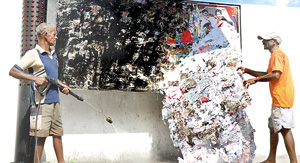News
‘They paste, we scrape’
Desperate to have illegal posters up even for a few hours, sometimes just in the dawn hours, parties and candidates are plastering walls with posters all over the country with just two weeks to go to the elections. Candidates eager to promote their preference numbers among voters send out crews shortly after midnight to put up posters despite being aware that the posters would be torn off within hours.

Operation “removing posters” in progress. Pic by Nilan Maligaspe
Their hope is that people will see the posters for at least a few hours or that even parts of posters remain so that voters could identify candidates. The Chief Inspector of Ratgama Police in Galle, Kamal Siriella, said party workers usually put up posters after 2am and police started removing them around 5.30 a.m, cleaning each area within an hour.
Sometimes, he said, after police cleaned up one area and moved to another, bill posters moved into the clean-up area and put new posters up. “This is a cat-and-mouse game: they paste, we scrape posters,” CI Siriella said. He sounded a positive note by saying he believed the removal of posters was helping to reduce election violence.
The Officer-in-Charge of the Warakapola Police, Chief Inspector Janakantha Hettiaarachi, said his officers had become full-time poster-removers and that police resources were stretched with fighting crime and well as providing protection for candidates.
“The police emergency hotline is contacted in the daytime by members of different parties giving tipoffs about where other parties have put up posters,” he said.
The current political situation had resulted in fewer battles over posters, Chief Inspector Hettiaarachi said.The Executive Director of Campaign for Free and Fair Elections (CaFFE), Keerthi Tennakoon said CaFFE observers were seeing a slight reduction of violence due to the removal of posters, banners and cutouts on private and public properties by police, local authority officials and private companies.
There had been 10 violent incidents linked to political posters – a reduction from previous years, the Executive Director of another election watchdog, the People’s Action for Free and Fair Elections (PAFFREL), Rohana Hettiarachchi, said.
Mr Tennakoon suggested that independent candidates and small party members could form strategies to appear in a single advertisement on television or newspapers where all their numbers, names and photos could included under their party logos, thereby reducing costs.
He also suggested that more candidates use social media for electioneering rather than relying on posters.
The ban on posters is hurting smaller parties and candidates who cannot afford commercials on television, radio and newspapers.
“New candidates who were provincial council members face difficulties when moving to gain popularity in a district because they are currently known only in a limited area,” explained United People’s Freedom Alliance (UPFA) Gampaha district candidate Prasanna Ranaweera.
He said now every candidate was focusing on alternative methods to promote themselves, using social media and delivering pamphlets and cards from house to house. Janatha Vimukthi Peramuna (JVP) Gampaha candidate Mahinda Jayasinghe acknowledged that the poster ban had reduced violence over poster space but added that it had taken away the “election atmosphere” from the public arena.
This, he said, would cause complications during the casting of ballots because new candidates’ numbers would not be known to voters as TV, internet and social media advertising was not available to everyone.The JVP was renowned for its good poster campaigns yet now had to bear the extra cost of TV and newspaper advertisements.
“We used to only have to bear the cost of printing posters – our party members volunteered to put up posters with no intention of gaining food, money or liquor for this work,” he said. Kotte P. Aberatane, a printer at a well-known press, told the Sunday Times that some printers were facing losses due to the reduction of poster printing.
But, he added, “People who want to print posters of candidates continue printing”. Most poster production took place at night, he explained. Normal poster sizes were 17×24 inches or 24×36 inches while those made to be pasted on lamp posts were about 5×18 inches. A colour poster cost about Rs. 8 and normally a candidate spent more than Rs. 700,000-800,000 to print 100,000 posters.
“The poster business is competitive: sometimes we have to print a poster for 25 cents to keep the client,” he said.
Police spokesman Assistant Superintendent of Police Ruwan Gunasekera said police were carrying out raids at night to catch bill posters and that police numbers had been boosted by 1900 other workers for this task.
Municipal Commissioner V.K.A Anura said a host of council employees including solid waste, city cleaners, roundabout maintainance workers had been co-opted to remove posters along with some private companies – some 1200 workers in all.
He said municipal council cleaners remove posters from 4-6am while private companies remove posters from 9.30pm-2am as well during other times of the day and that the municipal council had five high-pressure water guns for poster removal.

